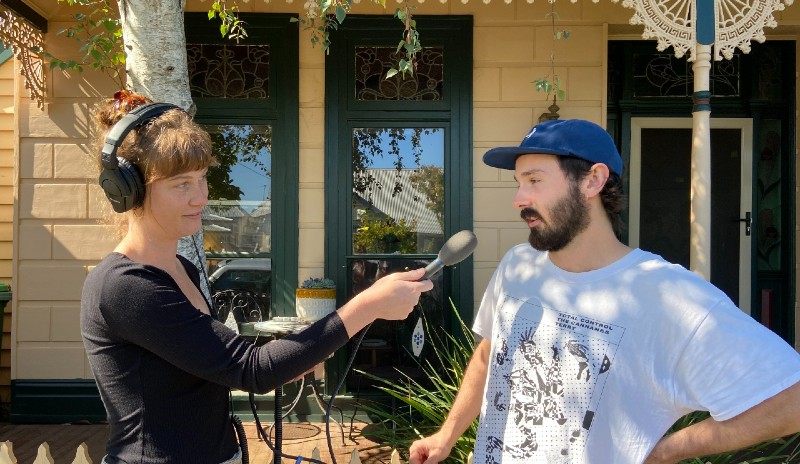Jordyn Beazley: the media industry may be tough, but you can make it
By Sarah Hall

Journalism students over the last two decades have faced a media industry in various states of calamity. News deserts have grown and the consumption of traditional media has shrunk, as the political economy of the web has incentivised clicks over public interest journalism. The industry has suffered drastic funding cuts (notably at the ABC), mass sackings and an increasingly monopolised landscape; the proportion of mastheads now owned by Murdoch nationally is creeping towards two thirds. The pandemic made matters worse, when dwindling advertising revenues led to the closure of over 150 regional papers.
But journalism students are not deterred. In fact, enrolments have all the while increased, or remained stable at Australian universities. A few years ago, only around a quarter of graduates were employed as journalists in traditional media roles. And while there are jobs for graduates outside of traditional newsrooms, the aspirations of journalism students to work in newsrooms still exist.
Yet, says Jordyn Beazley, recent graduate of the Master of Advancing Journalism, “From 2021 to now has actually felt like a great time to be a graduate journalist.”
“It seems much more promising than the landscape of two years ago when newsrooms were shutting down because of COVID. That was a pretty scary time to be studying journalism.”
One shift is the industry has been funding from the news media bargaining code. The bargaining code is a law introduced at the start of 2021 which requires large tech platforms to pay local news publishers for content made available through their platforms.
Though the bargaining code is far from perfect, money it has brought in from Google and Facebook deals has meant that a lot of newsrooms have actually expanded since its introduction.
COVID-19 has also had some positive effects on the consumption of traditional news media in Australia. After years of stagnation, paying for news has actually increased since the pandemic, and print news consumption has risen for the first time in six years despite all the paper closures, in contradiction to the global trend of increasing reliance on social media for news.
At the start of the year, Jordyn scored one of two cadet positions at Guardian Australia, a cadetship program that has been dormant for a number of years
In addition to Guardian Australia, Fairfax and Newscorp papers have offered more cadet positions this year than they have for a decade.
Before commencing at the University of Melbourne, Jordyn had a career in the foreign aid sector. Nervous about the career change from one tough industry and into another, the media manager at the foreign aid organisation where she worked gave her some advice: “You can get a job as a journalist. You just have to be the best.”
“I remember laughing at that advice and sarcastically saying ‘thanks, so simple’. But I guess it did give me the push I needed to know it’s going to be hard work.”
“I realised it’s not enough to just do your assignments and come out having put on your resume that you're a graduate of the Master of Journalism,” she emphasised.
She says it’s all about taking extra steps to get assignments published, and developing your portfolio.
Before starting the degree Jordyn felt she needed to improve her writing skills.
“So I worked really hard during my degree to improve my writing. I was constantly writing and publishing as much as I could on The Citizen,” she said.
The Citizen is the Centre For Advancing Journalism's online publication, which publishes independent news, features and analysis written by the University of Melbourne's journalism students. Jordyn published a number of articles which started as assignments through the publication, including reporting on Pacific affairs and climate change.
Publishing with The Citizen in turn gave her the confidence to pitch to other publications, including The Age, ABC and Crikey. She then became the recipient of the 2021 Schiavon cadetship, an annual cadetship offered through the Faculty of Arts at the University of Melbourne, designed to give Master of Journalism students a paid opportunity to write stories for the publication. This gave Jordyn the chance to further expand her repertoire and gain more editorial experience.
“[The year working at The Citizen] was a really good step to figure out what I was interested in, because I had a lot of freedom to choose what I wanted to write about and get a taste for different things,” she said.
“It was an opportunity to put into practice the skills I had learned during the degree, and also to hone skills I thought I needed to improve before stepping into the role I have now.”
Now as a cadet at Guardian Australia, Jordyn has had the opportunity to rotate around various desks including General News, Environment, Rural & Regional, Features Writing, Foreign Affairs and, at the time we spoke, the podcasting desk.
“I really enjoyed the foreign desk and I also really enjoyed rural and regional. I grew up in a rural area and so I enjoyed having the opportunity to do some writing that I felt was representative of the community I grew up in.”
One article she wrote which hit particularly close to home was about people living in campgrounds in her hometown in regional NSW because they can’t afford the skyrocketing rental prices.
Reflecting on her journey to becoming a journalist, Jordyn says: “When I started my degree, I was acutely aware of the difficulty of breaking into the [media] industry and I did question, a lot, whether I was making the right choice.”
But for Jordyn, the risk has certainly paid off.
You can check out Jordyn’s byline at Guardian Australia here and at The Citizen here. Find out more about the Master of Journalism here.
Banner image: Jordyn Beazley interviews a podcast subject. Photo supplied.